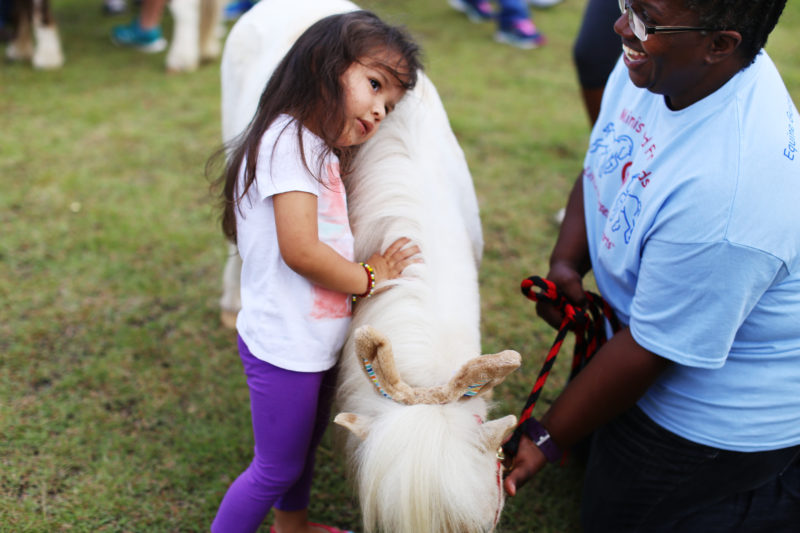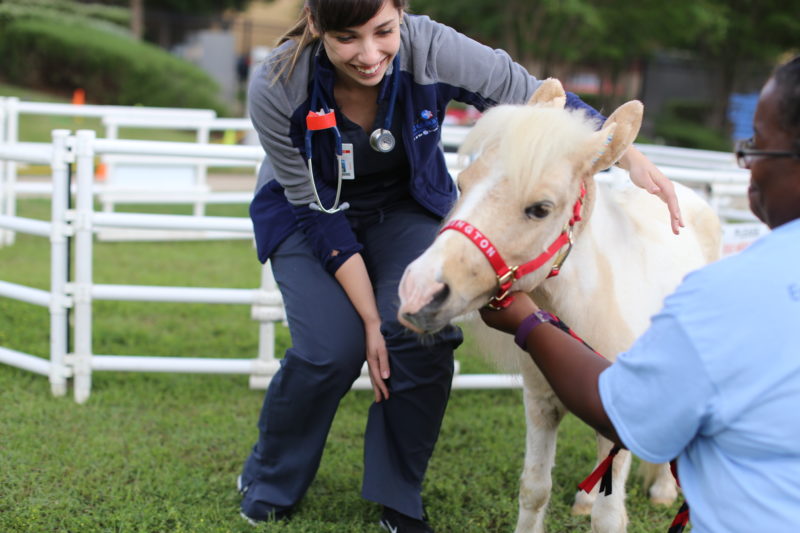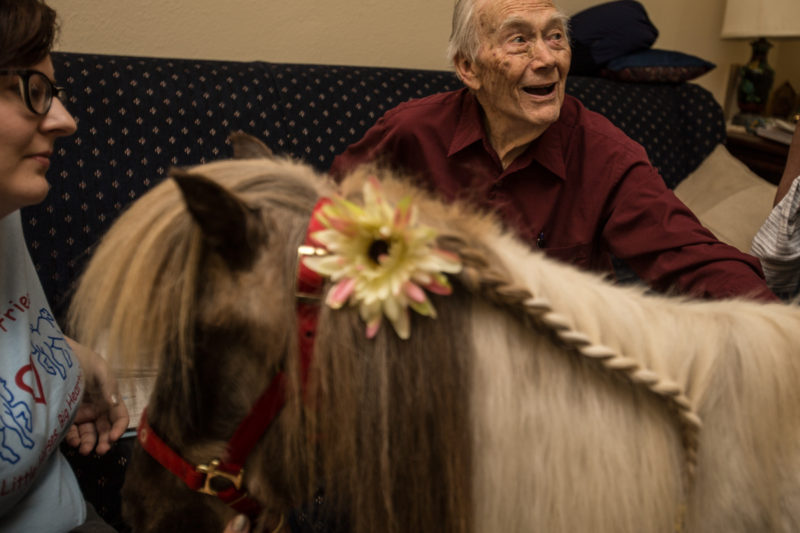These Tiny Horses Go to Work in Hospitals
By César E. López Linares
Photography By Kara Henderson
Reporting Texas

America Sanchez, 3, hugs during an event at Dell Children’s Hospital. Deborah Davis, holding the horse, is a volunteer with Minis and Friends, a miniature horse nonprofit. Kara Henderson/Reporting Texas
Sherry Montoya remembers the moment when a very small horse helped a very sick child.
It was August 0f 2014, and Alex Hermann, 9, was being wheeled out to the Healing Gardens at the Dell Medical Center for Children in Austin.
A few weeks earlier, he had been hit by lightning during a soccer practice in Bee Cave. He had entered a semi-vegetative state and was not able to move.
His mother, Jadwiga Hermann, put the wheeled stretcher where her son lay next to SeanMonet, a dark brown miniature horse, just 31 inches high, with big eyes and long eyelashes.
Alex’s empty gaze suddenly changed and he was able to move his hand a few inches — just enough to touch SeanMonet’s forehead with his fingertips.
Montoya recalls the parents’ reaction: “This little horse” had made possible what doctors and physical therapists had been trying for weeks to achieve.
Montoya is a miniature horse owner and a board member at Minis and Friends, an Austin-based nonprofit that brings miniature horses to hospitals and nursing homes to interact with people with physical, mental or emotional problems. She was there that day at Dell with Sally Iwanski, who started the nonprofit in 2007.
The idea goes back even farther, to 2002, when Iwanski learned about a ranch in Lockhart that had miniature horses. One day, after visiting her mother, who was suffering vascular dementia, Iwanski went to the ranch and sat with the animals. The experience relieved the stress she had accumulated by caring for her mother. After more trips to the ranch, she decided to get two mini horses of her own.
“I did that for three years and it became my thing. I thought later, ‘Why can’t I do this in Austin? And then I said, ‘I can!’ ” Iwanski said. She developed her love for horses as a child and would volunteer to work at stables on military bases so she could ride for free.

Kayleigh Todd, a University of Texas nursing student, takes a break from work to meet Remington, a miniature horse from Minis and Friends, at an event at Dell Children’s Hospital. Kara Henderson/Reporting Texas
In 2007, she and her husband Gil founded Minis and Friends as a nonprofit, and they started bringing the horses to children’s hospitals and nursing homes to provide a unique experience for patients.
They now have three minis on their small Southeast Austin ranch – SeanMonet, Mastercard and Remington – and a network that includes two other ranches in the Austin area that have seven more horses. There are two sister nonprofits in Lubbock and north of Dallas.
The group arranges mini horse visits every weekend. In April, Iwanski and Montoya brought five of their horses to Dell for an event for children with cancer.
The animals range from 28 to 31 inches high, small enough to travel in an ordinary van. Miniature horses were bred from full-sized horses to work as pack animals in gold mines in the 19th century, according to the International Museum of the Horse website.
The Iwanskis developed a system to assure that the interaction is safe for the patient and the horse. At least two volunteers accompany each horse as they make their rounds. One stands at the front of the horse, to carefully introduce the animal to the patient. The other stands in back of the horse, to protect against kicking or “accidents.” The little horses often wear cloth booties for sanitary reasons.
Each visit lasts up to 90 minutes. The organization does not to charge for the visits. Instead, Mini and Friends solicits donations; it is an IRS-approved nonprofit. Additionally, since 2007, the Iwanskis have organized twice-a-year boot camps for people interested in starting their own mini horse programs.
Each camp can accommodate eight people, and includes teaching their technique and issues such as starting a nonprofit, insurance, fund-raising and promotion.
The $1,000-a-person charge helps cover the cost of caring for the horses.
“With that, we pay for almost all the expenses, and we are OK. But what’s most gratifying is when we look out on Facebook all these little nonprofits that have popped up,” said Sally Iwanski, who works full-time at an Austin technology company, while her husband is an Army retiree.
Since the first workshop, 12 nonprofits have been started, and 10 are still operating. This year, the spring boot camp had participants from Texas, California, Colorado and northern Virginia.
Medical experts say that the mini horses inspire joy in patients and motivate them.
“Having animals present can be very motivating for children to do things like moving their hands or use speech when they are not likely to do that or not wanting to do that, because it engages them in a way they are not even realize they are doing it,” said Kimberlee Korte, director of the Child Life Department at the Dell Children’s. “Animals like mini horses can be very effective at helping children regain or use those skills.”
Horses offer the emotional support that children and adults in recovery need to keep a positive attitude and reduce their anxiety, Korte said. Animal therapy helps decrease the anxiety of what it is often a stressful situation.

Faries McDaniel, 92, who lives at Elmcroft Senior Living in South Austin, pets Bravo. An Austin nonprofit brings the miniature horses to senior centers and hospitals. Kara Henderson/Reporting Texas
Animal therapy “is not a substitute” for medical care, said Kathy Lynch, director of therapy services at the Vibra Rehabilitation Hospital in Lakeway, which brings in mini horses once a month to interact with patients. “You do have your medical services, but then you have something that is joyful, kind of a recreational therapy, something that is entertaining for the patients while they are here stuck in the hospital.”
More medical organizations are aware of the effects that mini horses have on people undergoing medical treatment and have given access to groups like Minis and Friends to become part of their alternative services for their patients.
“Some people underestimate the animal-human connection, how powerful it is. But we see it every weekend with all those different people,” Montoya said. “If they are suffering from cancer, they still have to have the chemo, but we are there to make it a little more pleasant, to put a smile on their faces and spread some joy.”